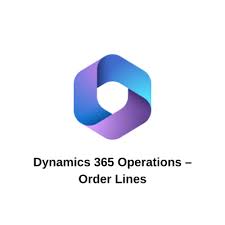Description
Dynamics 365 Operations – Order Lines
In Dynamics 365 for Operations (now part of Dynamics 365 Supply Chain Management), order lines are a critical component of managing sales and purchase orders. Here’s a brief overview of key aspects related to order lines:
Key Concepts
- Order Line Structure:
- Each order line represents a specific item or service being sold or purchased, detailing quantities, pricing, and other attributes.
- Order lines are tied to a parent order, whether it’s a sales order, purchase order, or transfer order.
- Status Management:
- Order lines can have different statuses (e.g., Open, Released, Invoiced), which helps track the lifecycle of the order.
- Pricing and Discounts:
- You can set pricing, apply discounts, and manage special pricing agreements directly at the order line level.
- Inventory Management:
- Order lines impact inventory levels, triggering stock movements when the order is processed, picked, packed, and shipped.
- Shipping and Fulfillment:
- Each order line can be linked to shipping details, including packing slips, shipping carriers, and tracking information.
- Line-Level Modifications:
- Users can modify order lines for changes in quantity, item specifications, or delivery dates even after an order is created.
Best Practices
- Regular Audits: Periodically review open order lines to ensure timely fulfillment and identify any bottlenecks.
- Automation: Utilize workflows and automation features for approval processes and notifications related to order lines.
- Integration: Ensure order lines are integrated with other modules (like inventory and finance) for seamless operations.
Common Tasks
- Creating an Order Line: Navigate to the relevant order (Sales or Purchase) and add a new line, entering details like item number, quantity, and price.
- Editing an Order Line: Open an existing order and select the line to modify its attributes as needed.
- Viewing Order Line History: Check the history of changes for an order line to track adjustments over time

